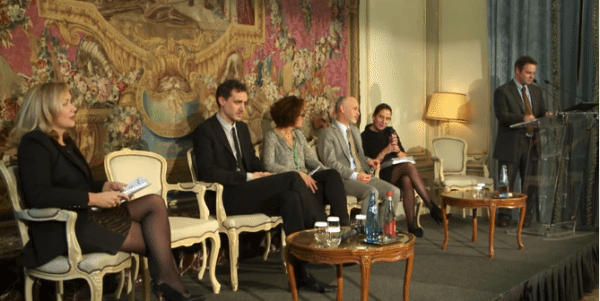Real estate crowdfunding started late in 2014 in France. But, hardly a year later, it is going strong with 26 platforms vying for a share of the market. However, as crowdfunding moves from real estate development to buy-to-let projects, new platforms are encountering some resistance from the French regulator.
 The opportunities and challenges faced by real estate crowdfunding in France are pictured in detail in a recent 300-page report by Chloé Magnier & Céline Mahinc “Le Crowdfunding Immobilier : son fonctionnement, ses enjeux, ses défis” in short EtudeCrowdimmo (Real estate crowdfunding, operating mode, opportunities and challenges).
The opportunities and challenges faced by real estate crowdfunding in France are pictured in detail in a recent 300-page report by Chloé Magnier & Céline Mahinc “Le Crowdfunding Immobilier : son fonctionnement, ses enjeux, ses défis” in short EtudeCrowdimmo (Real estate crowdfunding, operating mode, opportunities and challenges).
A comprehensive report
 Sponsored by several financial associations, including the Equity Crowdfunding Association (Association Française de l’Investissement Participatif (AFIP) and the National Association of Financial Advisors (ANACOFI) the Crowdimmo report is a must read for anybody interested in real estate crowdfunding in France.
Sponsored by several financial associations, including the Equity Crowdfunding Association (Association Française de l’Investissement Participatif (AFIP) and the National Association of Financial Advisors (ANACOFI) the Crowdimmo report is a must read for anybody interested in real estate crowdfunding in France.
The authors are two experts in private equity, fundraising and investing. An economist by training, Chloe Magnier collaborated with Kramer Levin on the “Crowdfunding in France” report published by PME Finance (A French association dedicated to SME Financing) in
2014, a report that strongly influenced the current French crowdfunding regulation. When a property developer approached Chloe for help to raise funds through crowdfunding, she discovered a burgeoning, yet already diverse and complex market. She thus joined forces with financial advisor Céline Mahinc to clarify the market’s opportunities and challenges. Their research effort included surveying 21 of the 26 existing real estate crowdfunding platform and interviewing experts and influencers.
The report now includes;
- A profile of 26 French real estate crowdfunding platforms.
- A presentation of the current regulations applying to real estate crowdfunding in France and major markets.
- Practical advice to SMBs seeking to raise money and investors seeking to invest.
- Prospective analysis and recommendations for improvement.
A Booming Market
Real estate crowdfunding started late in France but it is booming now. The number of platforms shot up from 4 in December 2014 to 26 in September 2015. Two thirds of the €40 million raised during that time was raised by three market leaders, Anaxago Immobilier and WiSeed Immobilier, the real estate arms of equity crowdfunding platforms Anaxago and WiSeed , and specialized real estate pioneer Lymo.
 French real estate crowdfunding still represents less than 0.1% of real estate lending by French banks, but it is already a significant 25% of the French crowdfunding market at large and its fastest growing segment.
French real estate crowdfunding still represents less than 0.1% of real estate lending by French banks, but it is already a significant 25% of the French crowdfunding market at large and its fastest growing segment.
The main characteristics of the French real estate crowdfunding are as follows:
- Property development (80% of platforms) leads ahead of fix-and-flip (60%) and buy-to-let (30%). Development funds are typically used to buy up the land which the developer will then use as collateral to borrow from banks the funds necessary for building construction.
- Residential properties (96%) dominates, ahead of commercial real estate (35%) and social housing (23%)
- Special Purpose Vehicles (92%) in form of a SAS Holding company sit between investors and the dedicated building company (SSCV) in order to limit the liability of investors to their contributions.
- Bonds (69%) are the preferred financial instruments ahead of shares (42%) or commercial papers (6%). The maturity of real estate development bonds is typically 12 to 36 months.
- Gross returns range from 3% to 20%. They are substantially higher for property development than for buy-to-let.
- Net returns are much lower as, in addition to the unknown default rate, fees and commission can eat up between 4% and 8%.
Demand from French retail investors is strong. French small savers love real estate. They invest around 60% of their wealth in housing and land and generally underestimate the risk of this asset class. Thanks to crowdfunding, they now have the opportunity to start a diversified portfolio of small real estate investments.
Real estate development is also popular because France has to fill a housing shortage. For many years, fiscal incentives have misdirected the market to build new homes in sparsely populated areas where there was no demand. This resulted in a stock of 2.6 million vacant dwellings while millions of French people live in substandard housing.
A Regulatory Bottleneck
Not everybody is completely happy with the rapid growth of real estate crowdfunding in France, though. The regulators have namely been dragging their feet to accredit new real estate crowdfunding platforms, in particular, the ones dealing in buy-to-let and life lease housing.
- French regulators worry about the many too many crowdfunding platforms. The French regulators, the Autorité des Marché Financiers (AMF) and the Autorité de contrôle prudentiel et de résolution (APCR), have so far granted to 90 for-profit crowdfunding platforms one of the two status defined by the crowdfunding-specific ordinance of October 1st, 2014
- Conseil en Investissement Participatif, CIP (crowdinvesting)
- Intermédiaire en financement participatif, IFP (crowdlending).
Donation and reward-based crowdfunding do not need such accreditations. But regulators know that there is no room for 90 for-profit competitors in the budding French market. They worry that many will fail and cause troubles when shutting down. Regulators have therefore recently put the brakes on accreditation. They are clearly attempting to discourage at least the weaker applicants. Of the 26 platforms surveyed by Crowdimmo, 8 do not yet have a suitable accreditation.
- Too many regulations compete to regulate crowdfunding. Numerous regulations, some more lax, some more stringent, potentially compete with the crowdfunding-specific ordinance of October 1st, 2014 to regulate crowdfunding. A few real estate agents and real estate developers, for example, have attempted to use their sector’s legal framework to launch crowdfunding-like operations. Others have used general corporate law or trade law. The regulators tend to favor more stringent regulations against their simplified, crowdfunding-specific versions, the above mentioned CIP and IFP status. For example, the European Alternative investment fund directive which regulates real estate investment funds and the Investment Service Provider accreditation (PSI in French) which regulates investment services pose, among other things, higher capital and prospectus requirements.
- Buy-to-let crowdfunding is viewed as not “entrepreneurial”. The French government has issued crowdfunding-specific regulation with the stated goal to support small and medium size enterprises by encouraging retail investors to help fill the equity gap they experience. While real estate development and fix-to-flip are perceived as somewhat entrepreneurial, buy-to-let is viewed by many among the regulators as a wealth management activity that should not be included in the crowdfunding regulation’s scope.
 Maxime Duhamelle, CEO and co-founder of Dividom, a buy-to-let crowdfunding platform, faced this objection:
Maxime Duhamelle, CEO and co-founder of Dividom, a buy-to-let crowdfunding platform, faced this objection:
“We were told that buy-to-let was less entrepreneurial than property development. But I fail to see the difference. From a legal point of view, rental property businesses and property developers both raise money and bring returns to investors, except that the former serve dividends during the whole life of a 15 year project, whereas developers do so once and after a few years. The real difference is that banks were not keen to invest property development whereas buy-to-let competes with established real estate investment funds.”
Crowdfunding is Not Clearly Defined
For Chloe Magnier, real estate crowdfunding raises the issue of the lack of precise definition of crowdfunding at large;
“Crowdfunding is not as clearly defined as, for example, banking. There is no precise characterization of what constitutes crowdfunding and, hence, no clear regulation agenda. Even as the crowdfunding-specific accreditations of CIP and IFP become increasingly difficult to obtain, they still are less demanding legal frameworks than the ones in which established real estate investment funds operate. The regulator is faced with the challenge of protecting retail investors while sustaining the crowdfunding market’s dynamics. It is walking a fine line.”
For their part, the authors of the Crowdimmo report submit several recommendations for a safe and sustainable market growth, such as:
- More transparency from platforms about the legal company structure of each project, the vetting process, exit opportunities, default rates, and platform fees
- More investor guarantees such as clear run-off management rules and insurance policies.
 Therese Torris is an entrepreneur and consultant in eFinance and eCommerce based in Paris. She has covered crowdfunding and P2P lending since the early days when Zopa was created in the United Kingdom. She was a director of research and consulting at Gartner Group Europe, Senior VP at Forrester Research and Content VP at Twenga. She publishes a French personal finance blog, Le Blog Finance Pratique
Therese Torris is an entrepreneur and consultant in eFinance and eCommerce based in Paris. She has covered crowdfunding and P2P lending since the early days when Zopa was created in the United Kingdom. She was a director of research and consulting at Gartner Group Europe, Senior VP at Forrester Research and Content VP at Twenga. She publishes a French personal finance blog, Le Blog Finance Pratique






